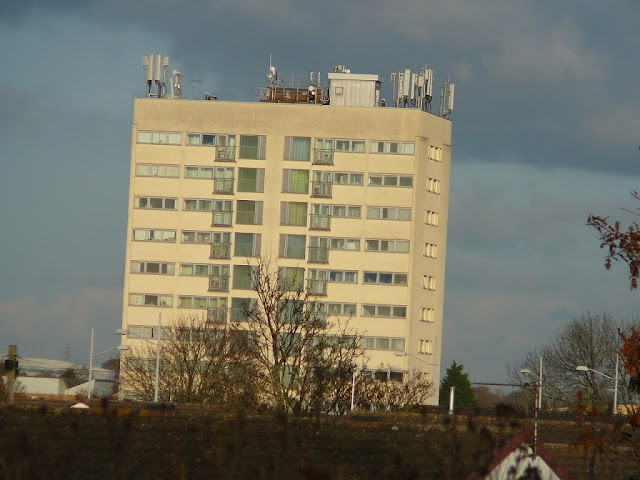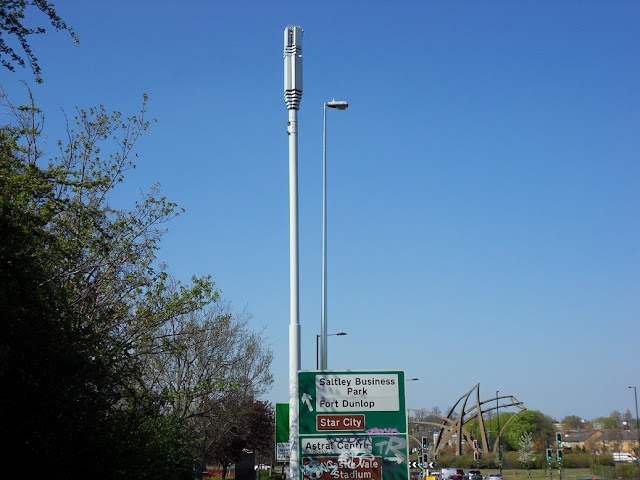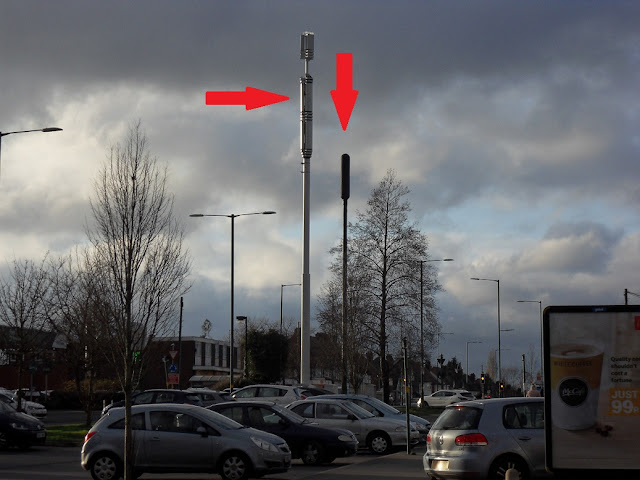You'll have to excuse the bad picture taking, it was taken at full zoom by hand with a Panasonic Lumix TZ1. Who lives in a flat like this? Especially on the top floor. The people who do live on the top floor, and several below that, when home, are basically never more than a few meters away from a big cluster of phone masts / antennas operating above their heads. I don't know what speed or "G" they are, whether 4G or 5G, but this is not good for health. Studies with no conflicts of interest [not bought and paid for by organizations with a vested interest] show that phone masts, and EMF radiation in general, have been proven to be hazardous for humans and animals.
Location: Chivenor House, Castle Vale, Birmingham, UK
Surely there should be some type of laws in place that states phone masts must be a certain distance away from a person or their residence. There are so many conflicting reports on this. Some state 150 meters, others 250 meters, or yards. Not sure if that distance applies to flats. If it doesn't, it should. The people living in these flats are basically living directly under several phone masts. I wonder if any of the people that live there are concerned at all. Or are they unaware of the dangers. Do the residents have any health problems that could have been caused by these phone masts, which are emitting high levels of radiation most likely all day and night.
Kentucky fried residents. How is this allowed?
I'd love to go to the top floor with a good quality digital EMF radiation meter, like a
Trifield TF2, walk around on the landing and stairs and see how high the read out is. I suspect it would be through the roof! Pardon the pun. What do you think the chances are that the levels are above the recommended ICNIRP guidelines. The “general public EMF limits” as ofcom UK calls them. My opinion: I'd say the levels would be much higher than what the telecom giant(s) who had them installed at this location claim it to be. But would any organization be held liable or punished in some way if the levels were found to be way too high?
Just a thought. Is there some sort of loop hole here. Where because each telecom organization own or rent just a few of the masts / antennas each, they can claim to be well under the ICNIRP guidelines for what they are using. But overall, with so many masts all together in one place, do the EMF levels actually go way above the safety limits when they are all combined.
Close up of one side. Wow. Ridiculous
So no ONE company can take any of the blame. Seems plausible, but I don't know for sure. If it were true, I think that all the telecom companies and the regulators who oversee the safety of the mast sites should all be held accountable. And telecom companies should not be allowed to cluster masts all together in one one spot like that if it means it highers the overall EMF radiation levels to unsafe limits.
Are these considered small cells, and if so, do they fall under a different set of guidelines than the pole masts we now see everywhere on the street. If this is the case it's a very devious loophole. Because all the masts / antennas on this roof combined equate to probably two phone masts, either on a pole or attached to the top of a
built up structure, so why should the rules be any different if the EMF output is just as high.
While I don't know for sure if the rules are different, and I haven't measured the levels at any mast site, it does appear that the safe distancing rules clearly don't apply here, or are not being followed. Could it be down to the fact that there's a thick layer of concrete [the roof floor] between the residents and the masts, or maybe the EMF levels fall within the "safe" EMF exposure limit zone.
Anyway, I was quite surprised when I seen this building, maybe because its a residential flat. But this is nothing new at all. With them being so high and not in line of vision I usually, subconsciously, take no notice because its becoming so common. Especially on commercial buildings. However, this one caught my eye, and I think its ridiculous how these masts are allowed to be in constant operation in such close proximity to where people live.

























